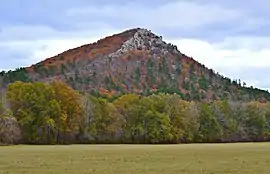Pinnacle Mountain (Arkansas)
Pinnacle Mountain is the second highest natural point in Pulaski County, Arkansas and main attraction of the 2,356-acre Pinnacle Mountain State Park.[2] It is located in the foothills of the Ouachita Mountains just outside of Little Rock, the capital and most populous city of Arkansas.
| Pinnacle Mountain | |
|---|---|
 Pinnacle Mountain as seen from Highway 300 | |
| Highest point | |
| Elevation | 1,013 ft (309 m) NAVD 88[1] |
| Coordinates | 34°50′29″N 92°29′09″W [1] |
| Geography | |
 Pinnacle Mountain | |
| Location | Pulaski County, Arkansas, U.S. |
| Parent range | Ouachita Mountains, U.S. Interior Highlands |
| Topo map | USGS Pinnacle Mountain |
Geography
Pinnacle Mountain is situated between the Big Maumelle River to the north and the Little Maumelle River to the south. Its proximity to the Arkansas River and steep south slopes make it a prominent landform.
The U.S. Board on Geographic Names once held that any landform greater than 1,000 feet of local relief classified as a mountain, while any landform less than 1,000 feet of local relief classified as a hill. Though Pinnacle Mountain is 1,013 feet above mean sea level, it is only 763 feet of local relief, which would have made it a hill. Due to broad disagreement over this naming convention, the classification system was abandoned in the early 1970s. According to the Geographic Names Information System (GNIS), Pinnacle Mountain is a summit, which is defined as "a prominent elevation rising above the surrounding level of the Earth's surface", but does not include mountains or hills, among other things.[3][4]
Geology
Contrary to rumors, Pinnacle Mountain is not a volcano. Despite its resemblance to a cinder cone, Pinnacle Mountain is composed of deep-water sedimentary rock, the Pennsylvanian Jackfork Sandstone.[5] Named for Jackfork Mountain in Pittsburg and Pushmataha counties, Oklahoma, the Jackfork Sandstone at Pinnacle Mountain is massive, fine- to coarse-grained, mostly tan quartzitic sandstone of great hardness.[6] Cinder cones, on the other hand, form from the eruption of mafic lavas and are composed of extrusive igneous rocks such as basalt. Research proposes that the Jackfork Sandstone was deposited in a developing foreland basin during the early stages of the Ouachita Orogeny.[7] It is conventionally interpreted as a sequence dominated by turbidites in a submarine fan setting, however, diagnostic internal features, such as inverse size grading, indicate sand emplacement by debris flows and slumps in a slope setting.[7] The terrane has been deeply eroded since its deformation during the late Paleozoic.[8]
Hiking
Two routes ascend Pinnacle Mountain: the 1.5-mile West Summit Trail (marked by yellow blazes), which starts at the West Summit parking off of Highway 300, and the 1.5-mile East Summit Trail (marked by red and white blazes), which starts at the East Summit parking lot off of Pinnacle Valley Road.[9] The West Summit Trail is more trafficked than the East Summit Trail, partly because the East Summit Trail involves scrambling up a steep slope. Both, however, can be quite overcrowded due to their proximity to Little Rock. The 2.5-mile Base Trail (marked by light green blazes) loops completely around the base of Pinnacle Mountain and connects the West Summit and East Summit trailheads.[9] The 223-mile Ouachita Trail (marked by blue blazes) overlaps a 0.5-mile section of the Base Trail and continues another 1.5 miles to the visitor center after crossing Pinnacle Valley Road at the East Summit parking lot.[9]
References
- "MAUMELLE RESET". NGS data sheet. U.S. National Geodetic Survey. Retrieved 2017-10-30.
- "Pinnacle Mountain State Park". Arkansas State Parks. Retrieved 2017-10-30.
- "Pinnacle Mountain". Geographic Names Information System. United States Geological Survey. Retrieved 2017-11-21.
- "Feature Class Definitions". United States Geological Survey. Retrieved 2017-11-21.
- "Geologic Map of Arkansas" (PDF). Arkansas Geological Survey. Retrieved 2017-10-22.
- "Stratigraphic Summary of the Arkansas River Valley and Ouachita Mountains". Arkansas Geological Survey. Archived from the original on 2018-05-29. Retrieved 2017-10-30.
- Shanmugam, G.; Moiola, R.J. (1995). "Reinterpretation of Depositional Processes in a Classic Flysch Sequence (Pennsylvanian Jackfork Group), Ouachita Mountains, Arkansas and Oklahoma". AAPG Bulletin. 79 (5): 672–695.
- Morris, R.C. (1974). "Sedimentary and Tectonic History of the Ouachita Mountains". Special Publications of SEPM. 22: 120–142.
- "Trails of Pinnacle Mountain State Park" (PDF). Arkansas State Parks. Retrieved 2017-10-31.